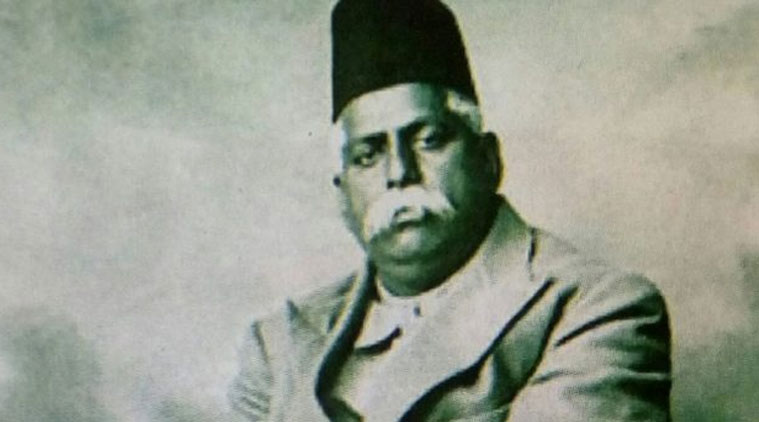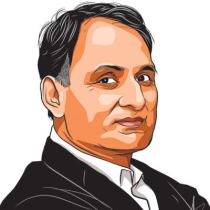Hedgewar, for posterity
Dialogue with those he disagreed with, struggle for free India, marked his political life.

K B Hedgewar
Pranab Mukherjee’s tribute to K B Hedgewar, the RSS founder, as a “great son of Mother India”, was implausibly detested by Congress and Left historians. This is apparent from the party’s indictment that Hedgewar opposed the Civil Disobedience Movement in 1930. This statement needs to be examined beyond the polemics and politics which in contemporary India has been subjected a to binary anchored in fabrication and half-truths.
Indian political culture during the colonial era embodied democratic values and political divergence did not determine social associations. The worldviews of the RSS and Congress had undeniably differed during the period but that did not slacken reciprocal admiration and dialogue between divergent viewpoints. The tribute to Hedgewar by V N Gadgil, an influential Congressman, authenticates this: “Despite our differences with him, his patriotism and efforts to regain the nation’s pride are unforgettable.” Similarly, Pramila Oak the editor of Matribhoomi, a daily from Akola, known for its disapproval of the RSS, in an editorial on June 25, 1940, said something which holds a lesson for contemporary intellectuals: “There may be differences between our and his approach of serving the people and striving for the country’s independence, yet we cannot escape from praising his traits of sacrifice, undaunted determination, and rare organisational skill.”
Academic objectivity must anchor subjective assessments through hard facts. Here are some facts about Hedgewar’s role in the freedom movement. Hitavada, an English daily, reported on July 24, 1930, that an “enormous crowd” assembled at the Nagpur railway station to send off Hedgewar and his companions for the Satyagraha. And the National Archive of India has a police report stating that he led thousands of men and women to break the forest law. Newspapers like Maharashtra, a Marathi daily and Hitavada reported on July 24, 1930, that he was sentenced to nine months rigorous imprisonment under the CrPC 117 and CrPC 379.
A revolutionary in his early days in Bengal, Hedgewar’s popularity swelled during the Non-Cooperation Movement (NCM) in 1921, especially in the Central Provinces and Berar. As a secretary of the Non-Cooperation Board, he effectively mobilised the youth and Nagpur emerged as an epicentre of the movement. He floated the Nagpur National Union to support the NCM. The government charged him for “seditious” speeches and he was sentenced one-year rigorous imprisonment. His trial proved distressing for judges and the colonial administration. Maharashtra quoted Hedgewar’s statement in court On July 10, 1921. “We don’t have the desire to make England our colony… we simply want to rule as masters of our own country.”
His anti-colonial credo remained unchanged through is life and he was against any dialogue or compromise with the colonial forces. The inspiration behind the formation of the RSS was to revive the idea of a civilisational nation and the cultural-corporeal bond beyond caste, sect and religious feelings. This is obvious from his speech delivered in Poona which Dyanprakash quoted on April 14, 1935: “Our dharma, which is distinct in the world, preaches us to live with higher elements of life, sacrifice and sagacity. In spite of all these, why has there been a downward trajectory of our society?” His concept of the Hindu Rashtra had a civilisational-cultural construct as an “adjective of India, not an objective”. But detractors twisted this idea by labelling it a constricted theocracy as well as majoritarianism. Hedgewar’s shift from the customary conceptions of contemporary Hindu organisations was elucidated by Shri Sham in Kesari on July 5, 1940 “while every Hindu sangathanist was thinking and acting in view of Hindu domination in politics and countering Muslim separatism Dr Hedgewar confronted some fundamental questions: how to rejuvenate the Hindu society? Who would do this arduous work? And, when it would be initiated?”
Hedgewar underlined that the alienation from the cultural legacies and civilisational trajectory of the nation as the reason for communal polarisation. He raised a vital question: Why did India remain secular even when the world witnessed unhealthy competitions of religious expansionism? It is because of the cultural-spiritual background of secularism which optimises faith in diversities.
When Mukherjee said in his speech in Nagpur India bears a five-thousand-year civilisation, one should not take it merely as a count of centuries. The idea of India cannot be only a constitutional construct or a legacy of the freedom movement. It draws strength from Hindu cultural and civilisational legacies which underline not only diversities but faith in that idea. Mohan Bhagwat, in his speech, explained the role of culture and ethos in creating Indianness. Hedgewar had argued that the question is to be resolved not through an academic club but by a mass awakening using social, cultural, economic and political tools. The RSS has been doing exactly that.
Hedgewar never aimed at a hegemony of ideas and, therefore, had unfailingly been in dialogue with people of opposite camps. He said, “democracy does not reside in speeches but in actual practices of its votaries”. Sri Ram Gosavi wrote in Maratha on July 12, 1940, “his greatness is due to his infinitely accommodating nature… He could attract persons of opposite natures for the cause of the motherland. It is for this reason the RSS could grow so large.” Hedgewar stands for both the present and posterity. Unlike others, his potential to inspire people to leave home and hearth to serve the nation remains undiminished. Dialogue is the only way to know and understand his life and mission.
Sinha associate professor, Delhi University and honorary director, India Policy Foundation, is the author of a biography of K B Hedgewar
For all the latest Opinion News, download Indian Express App
More From Dr Rakesh Sinha
- Mis-reading archbishop’s letterAnti-RSSism must not obscure that it is part of an organised smear campaign..
- Category confusionsFour dominant narratives about the nature of the RSS run parallel to each other. Most do not understand the organisation’s ethos...
- False narrativePsuedo-secular intelligentsia has fractured the concept of Indian citizenship, kept Muslims in an impermeable silo of insecurity...








































No hay comentarios:
Publicar un comentario